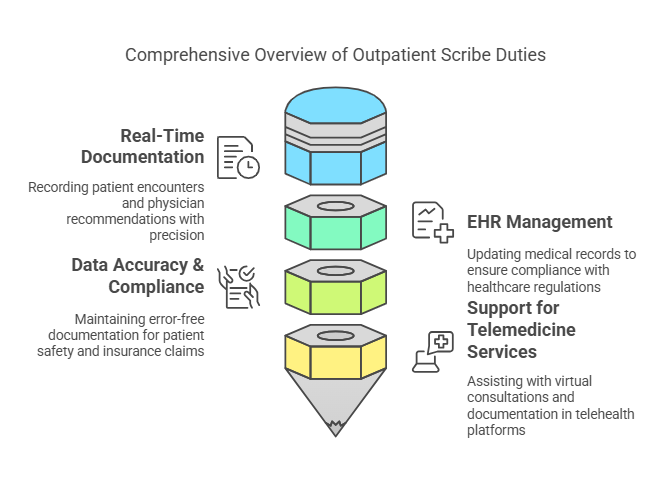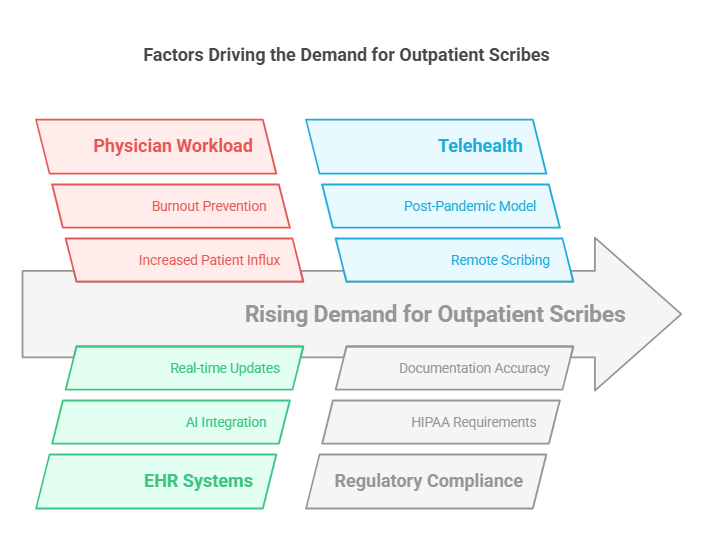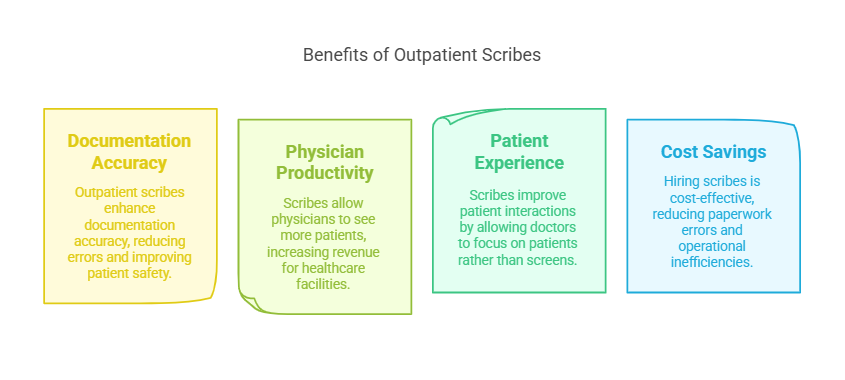The Growing Importance of Outpatient Scribes in Modern Healthcare
In 2025, the healthcare industry continues to evolve rapidly, with an increasing focus on digital transformation, efficiency, and patient-centered care. One of the most significant advancements in modern healthcare is the rising demand for outpatient scribes. These professionals play a crucial role in ensuring accurate medical documentation, reducing physician burnout, and improving overall patient experiences.
This article explores the importance of outpatient scribes in 2025, their benefits, career opportunities, and how aspiring medical professionals can step into this evolving role.
The Expanding Role of Outpatient Scribes in 2025
Outpatient scribes work in clinics, urgent care centers, and specialty practices, assisting physicians with real-time documentation during patient visits. They help streamline workflows by recording patient histories, test results, prescriptions, and treatment plans in electronic health records (EHRs).
Key Responsibilities of Outpatient Scribes:
Real-Time Documentation: Recording patient encounters, diagnoses, and physician recommendations with precision.
EHR Management: Updating medical records, ensuring compliance with evolving healthcare regulations.
Data Accuracy & Compliance: Maintaining error-free documentation to support patient safety and insurance claims.
Support for Telemedicine Services: Assisting with virtual consultations, ensuring seamless documentation in telehealth platforms.
Why the Demand for Outpatient Scribes is Rising
1. Increased Physician Workload & Burnout Prevention
With the growing patient influx, physicians struggle with extensive documentation, leading to burnout. Outpatient scribes alleviate this burden, allowing doctors to focus more on direct patient care.
2. Advanced Electronic Health Record (EHR) Systems
By 2025, AI-driven EHR systems have become more integrated, requiring skilled scribes to manage real-time updates and ensure seamless physician-patient interactions.
3. Telehealth & Remote Scribing
The post-pandemic healthcare model continues to emphasize telehealth services, making remote scribes an essential part of virtual patient consultations.
🌐 Insight: Telehealth.HHS.gov – Telemedicine Growth
4. Regulatory Compliance & Accuracy in Medical Documentation
Stricter compliance requirements under HIPAA and other healthcare laws have increased the need for precise, error-free documentation—a role efficiently handled by outpatient scribes.
🛠️ Regulation Update: (Source)
Benefits of Having Outpatient Scribes
✅ Enhanced Documentation Accuracy
Medical errors due to documentation mistakes can lead to misdiagnoses. Outpatient scribes help ensure precise, real-time documentation, reducing legal risks and improving patient safety.
✅ Boosted Physician Productivity
With scribes handling documentation, physicians can see more patients per day, leading to increased revenue for healthcare facilities.
✅ Improved Patient Experience & Satisfaction
Patients appreciate when doctors focus entirely on them rather than screens. With scribes managing records, doctor-patient interactions become more personal and meaningful.
📊 Data Insight: A recent report by the Centers for Medicare & Medicaid Services (CMS) found that practices using scribes increased patient throughput by 25%. (Source)
✅ Cost Savings for Medical Practices
Hiring outpatient scribes is more cost-effective than overloading medical professionals with documentation tasks. A well-trained scribe can reduce paperwork errors, preventing costly legal and operational inefficiencies.
💡 Government Resource: CMS – Medical Practice Optimization
Becoming an Outpatient Scribe in 2025
If you're looking to enter the healthcare industry, becoming an outpatient scribe is a great starting point. This role provides hands-on experience in medical settings and opens doors for future careers in healthcare.
📌 Steps to Becoming an Outpatient Scribe
Obtain Basic Medical Knowledge: Familiarize yourself with medical terminology, anatomy, and patient care processes.
Enroll in a Certified Training Program: Consider a Medical Scribe Certification course from ACMSO or other recognized institutions.
Gain Hands-On Experience: Internships or shadowing opportunities in clinics can provide real-world exposure.
Develop EHR Proficiency: Learn the latest EHR software used in outpatient care.
Pursue Advanced Certifications: Specializations like Advanced Clinical Medical Scribe Certification increase employability.
📖 Recommended Resource: NIH – Medical Education & Training
Why Certification Matters in 2025
With healthcare employers preferring certified scribes, investing in professional certification is essential. According to the latest hiring trends, certified scribes are 60% more likely to get hired than non-certified candidates.
Recommended Certification Paths:
Advanced Clinical Medical Scribe Certification (ACMSO)
Certified Medical Scribe Specialist (CMSS)
Health Information Management (HIM) Certification
📊 Industry Insights: U.S. Bureau of Labor Statistics – Medical Scribe Careers
Career Progression: From Outpatient Scribe to Healthcare Professional
Many professionals use medical scribing as a stepping stone toward advanced careers, including:
🔹 Medical Assistant
🔹 Physician Assistant (PA)
🔹 Nurse Practitioner (NP)
🔹 Health Information Specialist
🔹 Telemedicine Support Specialist
💡 Explore Career Options: ExploreHealthCareers.org
The Future of Outpatient Scribing: 2025 and Beyond
By 2025, outpatient scribing has evolved with:
AI-Enhanced Scribe Software: Automating repetitive documentation tasks while keeping human oversight.
Virtual & Remote Scribing Roles: Expanding opportunities for remote work in healthcare.
Greater Integration with Telehealth Services: Making scribing an integral part of virtual medical consultations.
📖 Emerging Trends: CDC – Healthcare Innovation Reports
Conclusion
Outpatient scribes are essential in modern healthcare, ensuring accurate documentation, reducing physician workload, and improving patient experiences. As the industry advances, becoming a certified outpatient scribe offers long-term career opportunities in various healthcare settings.
If you're considering a career in medical scribing, certification is the first step toward success. Programs like ACMSO’s Medical Scribe Certification provide the necessary training to excel in this evolving profession.
✅ Ready to Start Your Career as an Outpatient Scribe?
Take the first step today by enrolling in a recognized medical scribe certification program and becoming part of the future of healthcare documentation!
📖 Frequently Asked Questions (FAQs)
1. What is the Role of an Outpatient Scribe in Healthcare?
An outpatient scribe assists healthcare professionals by documenting patient encounters in real-time. Their responsibilities include recording patient histories, test results, diagnoses, and treatment plans in electronic health records (EHRs). This support allows physicians to focus more on patient care rather than administrative tasks.
2. Why is the Demand for Outpatient Scribes Increasing in 2025?
The demand for outpatient scribes is rising due to advancements in EHR technology, the growing popularity of telehealth services, and increasing physician workloads. As healthcare regulations become more stringent, the need for accurate, timely documentation has become essential for compliance and patient safety.
3. How Can I Become a Certified Outpatient Scribe?
To become a certified outpatient scribe, you should:
Enroll in a reputable training program like the Advanced Clinical Medical Scribe Certification (ACMSO).
Gain practical experience in a clinical setting.
Develop proficiency in EHR systems and stay updated on HIPAA compliance requirements.
For more information, visit HealthIT.gov for resources on health information technology.
4. What Are the Key Skills Required for an Outpatient Scribe?
Successful outpatient scribes possess:
Medical Terminology Knowledge: Understanding medical terms and procedures.
Attention to Detail: Ensuring accurate documentation of patient encounters.
Tech Proficiency: Navigating modern EHR systems.
Communication Skills: Collaborating effectively with healthcare teams.









